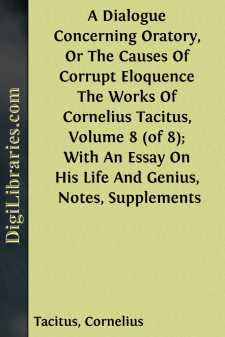Categories
- Antiques & Collectibles 13
- Architecture 36
- Art 48
- Bibles 22
- Biography & Autobiography 813
- Body, Mind & Spirit 142
- Business & Economics 28
- Children's Books 13
- Children's Fiction 10
- Computers 4
- Cooking 94
- Crafts & Hobbies 4
- Drama 346
- Education 46
- Family & Relationships 57
- Fiction 11828
- Games 19
- Gardening 17
- Health & Fitness 34
- History 1377
- House & Home 1
- Humor 147
- Juvenile Fiction 1873
- Juvenile Nonfiction 202
- Language Arts & Disciplines 88
- Law 16
- Literary Collections 686
- Literary Criticism 179
- Mathematics 13
- Medical 41
- Music 40
- Nature 179
- Non-Classifiable 1768
- Performing Arts 7
- Periodicals 1453
- Philosophy 64
- Photography 2
- Poetry 896
- Political Science 203
- Psychology 42
- Reference 154
- Religion 513
- Science 126
- Self-Help 84
- Social Science 81
- Sports & Recreation 34
- Study Aids 3
- Technology & Engineering 59
- Transportation 23
- Travel 463
- True Crime 29
Cornelius Tacitus
Cornelius Tacitus was a prominent Roman historian and senator, known for his critical and analytical approach to history. He wrote significant works like "Annals" and "Histories," which focus on the Roman Empire, covering events from the reign of Tiberius to Domitian. Tacitus is valued for his insights into the corruption of power and his sharp critique of the moral decay of Roman society. His writing style is characterized by its conciseness, irony, and pessimism about human nature.
Author's Books:
Sort by:
A DIALOGUE CONCERNING ORATORY, OR THE CAUSES OF CORRUPT ELOQUENCE. . General introduction, with the reasons for writing an account of the following discourse. . The persons engaged in the dialogue; at first, Curiatius Maternus, Julius Secundus, and Marcus Aper. . Secundus endeavours to dissuade Maternus from thinking any more of dramatic composition. . Maternus gives his reasons for persisting. . Aper...
more...
INTRODUCTION. Very little is known concerning the life of Tacitus, the historian, except that which he tells us in his own writings and those incidents which are related of him by his contemporary, Pliny. His full name was Caius Cornelius Tacitus. The date of his birth can only be arrived at by conjecture, and then only approximately. The younger Pliny speaks of him as prope modum aequales, about the...
more...



